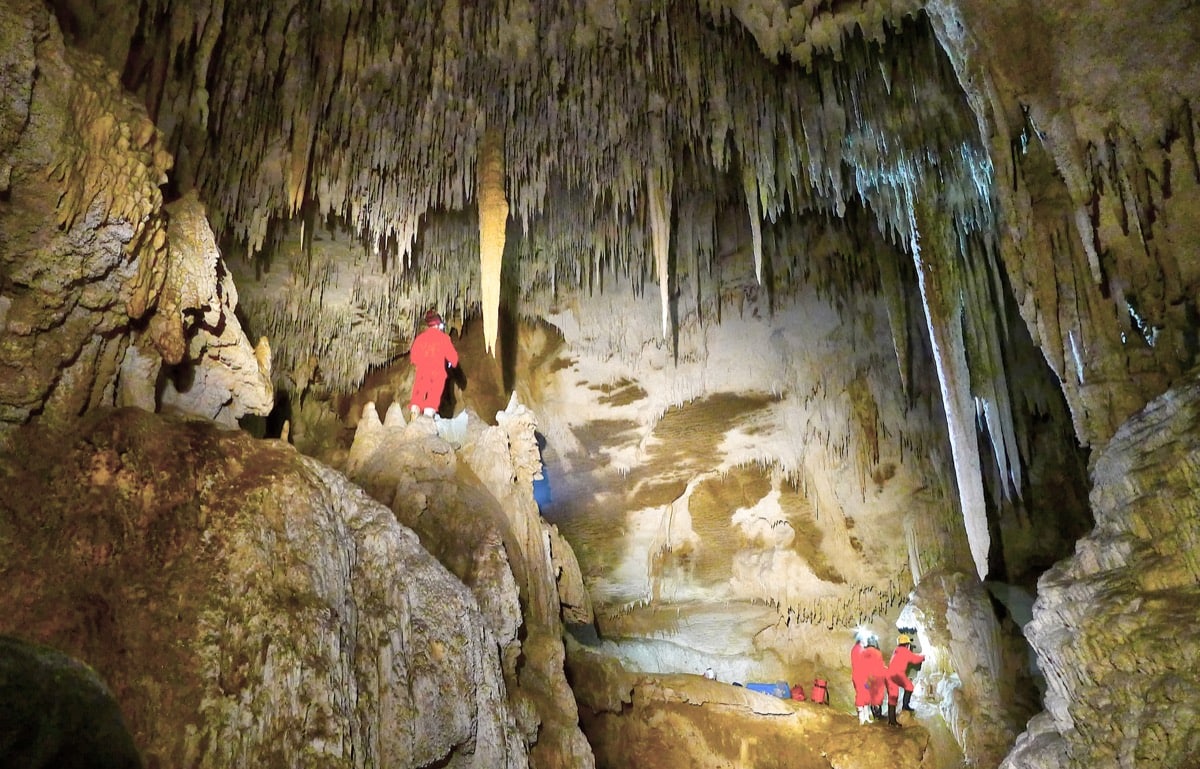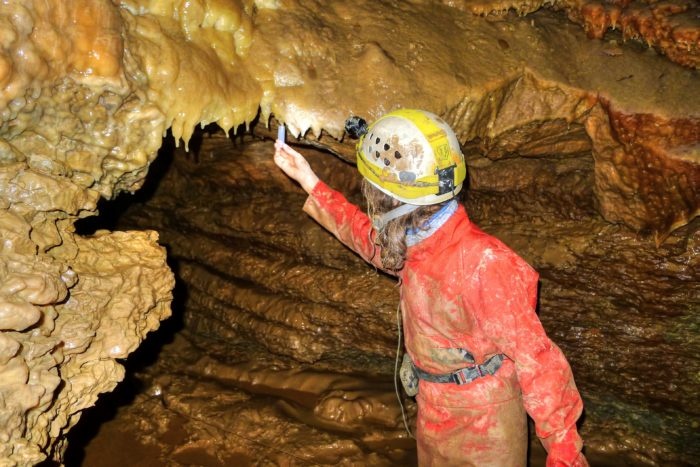
The increasing number of data sources, the complex nature of the systems under investigation, data with gaps or irregular sampling, heavy tailed data, data uncertainties, etc. are frequent challenges in climate and sustainability research. The working group “Development of advanced time series analysis techniques” focuses on development of novel and alternative data analysis approaches for identifying the interactions in highly coupled complex systems, describing transitions and stability of dynamical systems, or reducing the complexity of specific problems.
Interested in joining our research? Check potential topics for Master and PhD projects.
Highlights
Recent highlights include the recurrence analysis of a 66 million long palaeoclimate record and the collection of new speleothem samples from caves in Thuringia (Germany) and Alps (Switzerland).
Toolbox for Complex Systems (TOCSY)
Innovative methods for modern nonlinear data analysis are publicly available in our Toolbox for Complex Systems.
Research background
Real world processes are complex and appear to be chaotic, i.e., their predictability is limited. Nonlinear theory offers new approaches for the development of modern data analysis techniques which can shed light on specific features in the dynamics of complex systems where standard or linear methods are not able to study them.
Example: Challenges in palaeoclimate research

Recent projects are collecting new samples and extending the data archive of the climate of the past. New high precision records, e.g., such from stalagmites or ocean drilling projects, offer new insights into the climate system and extreme events in the past that have not been available before on such high-resolution time-scales. A reliable interpretation requires statistical analysis and comparison with many environmental variables.
Such geological archives usually come with specific problems, such as time uncertainties and irregular sampling – challenges that hamper the application of standard methods or introducing nontrivial biases in the final results. Moreover, the definition of extreme climate events on the basis of geological archives is difficult, as it strongly depends on the time scale and since geological archives usually aggregate and integrate the environmental conditions over a longer period of time. Data analysis methods are required that can be applied on such kind of data to derive reliable information about climate variability and the distribution of extremes while properly taking uncertainties into account.
Methods
We are developing and adopting methods of non-linear time series analysis for direct application to data with irregular sampling and with special focus on time uncertainties. This includes simple methods like kernel-based correlations, but also more complex ones like conditional mutual information, edit distance and recurrence based measures. We further develop methods for studying recurrence properties of extreme events data. New definitions of recurrence and extremes are in development for the particular consideration of time uncertainties. The recurrence concept is under extension to study spatio-temporal data. Moreover, we work on the development of methods for studying couplings, interrelations, and causal directions within extended systems. This research is also a basis for the reconstruction of complex networks and networks of networks.
Research Highlights
Introduction of a framework for dealing with time uncertainties in palaeoclimate proxy records (COPRA) and of time series analysis approaches for the direct application on irregularly sampled time series. These development are the core for the subsequent investigation of regime changes and dynamical transitions, as well as spatio-temporal investigation of palaeoclimate data by complex networks (palaeo-climate networks) and have been applied in several palaeoclimate studies, e.g., for the investigation of the migration of the climate zones' border in central Europe using data from the Blessberg Cave, Germany.
- D. Eroglu, F. H. McRobie, I. Ozken, T. Stemler, K.-H. Wyrwoll, S. F. M. Breitenbach, N. Marwan, J. Kurths: See-saw relationship of the Holocene East Asian-Australian summer monsoon, Nature Communications, 7, 12929p. (2016).
- B. Goswami, N. Boers, A. Rheinwalt, N. Marwan, J. Heitzig, S. F. M. Breitenbach, J. Kurths: Abrupt transitions in time series with uncertainties, Nature Communications, 9, 48 (2018).
- S. F. M. Breitenbach, B. Plessen, S. Waltgenbach, R. Tjallingii, J. Leonhardt, K. P. Jochum, H. Meyer, B. Goswami, N. Marwan, D. Scholz: Holocene interaction of maritime and continental climate in Central Europe: New speleothem evidence from Central Germany, Global and Planetary Change, 176, 144–161 (2019).
- V. Skiba, G. Jouvet, N. Marwan, C. Spötle, J. Fohlmeister: Speleothem growth and stable carbon isotopes as proxies of the presence and thermodynamical state of glaciers compared to modelled glacier evolution in the Alps, Quaternary Science Reviews, 322, 108403 (2023).
- S. M. Vallejo-Bernal, F. Wolf, N. Boers, D. Traxl, N. Marwan, J. Kurths: The role of atmospheric rivers in the distribution of heavy precipitation events over North America, Hydrology and Earth System Sciences, 27(4), 2645–2660 (2023).
- T. Braun, S. F. M. Breitenbach, V. Skiba, F. A. Lechleitner, E. E. Ray, L. M. Baldini, V. J. Polyak, J. U. L. Baldini, D. J. Kennett, K. M. Prufer, N. Marwan: Decline in seasonal predictability potentially destabilized Classic Maya societies, Communications Earth & Environment, 4, 82 (2023).
Several approaches for the investigation of direct and indirect links, causal couplings, or coincidences of special events have been developed, critically tested, and finally applied to climate data, answering questions about differences in the spatial patterns of extreme monsoonal rainfall in India and South America, interrelations between the East Asian Summer monsoon and Indian Summer monsoon, or causal relationships between global warming, solar and volcanic activity, and human impact.
- A. M. T. Ramos, A. Builes-Jaramillo, G. Poveda, B. Goswami, E. E. N. Macau, J. Kurths, N. Marwan: Recurrence measure of conditional dependence and applications, Physical Review E, 95, 052206 (2017).
- D. A. Smirnov, S. F. M. Breitenbach, G. Feulner, F. A. Lechleitner, K. M. Prufer, J. U. L. Baldini, N. Marwan, J. Kurths: A regime shift in the Sun–Climate connection with the end of the Medieval Climate Anomaly, Scientific Reports, 7, 11131 (2017).
- A. Agarwal, L. Caesar, N. Marwan, R. Maheswaran, B. Merz, J. Kurths: Network-based identification and characterization of teleconnections on different scales, Scientific Reports, 9, 8808 (2019).
- W. C. McCool, B. F. Codding, K. B. Vernon, K. M. Wilson, P. M. Yaworsky, N. Marwan, D. J. Kennett: Climate change-induced population pressure drives high rates of lethal violence in the Prehispanic central Andes, Proceedings of the National Academy of Sciences, 119(17), e2117556119 (2022).
Further extending of recurrence analysis is an ongoing topic. The combination with the complex network approach has provided additional measures of complexity for the study of dynamical transitions in complex systems (recurrence networks). We have extended this approach by multiplex recurrence networks to study multivariate data, by new approaches for analysing irregularly sampled time series and data with uncertainties, by multiscale concepts, and by using alternative recurrence definitions for extreme events or spatio-temporal data. The critical and systematic study of the recurrence plot concept results in better understanding of this method and led to powerful correction schemes. This special concept of data analysis has been used, e.g., to precisely detect and classify the characteristic dynamical properties of the four dominant climate states of the Cenozoic (hothouse, warmhouse, coolhouse and icehouse) on a new climate reference curve for the last 67 million years.
- I. Ozken, D. Eroglu, S. F. M. Breitenbach, N. Marwan, L. Tan, U. Tirnakli, J. Kurths: Recurrence plot analysis of irregularly sampled data, Physical Review E, 98, 052215 (2018).
- D. Eroglu, N. Marwan, M. Stebich, J. Kurths: Multiplex recurrence networks, Physical Review E, 97, 012312p. (2018).
- Y. Zou, R. V. Donner, N. Marwan, J. F. Donges, J. Kurths: Complex network approaches to nonlinear time series analysis, Physics Reports, 787, 1–97 (2019).
- K. H. Kraemer, N. Marwan: Border effect corrections for diagonal line based recurrence quantification analysis measures, Physics Letters A, 383(34), 125977 (2019).
- T. Westerhold, N. Marwan, et al.: An astronomically dated record of Earth's climate and its predictability over the last 66 Million Years, Science, 369(6509), 1383–1387 (2020).
- K. H. Kraemer, F. Hellmann, M. Anvari, J. Kurths, N. Marwan: Spike spectra for recurrences, Entropy, 24(11), 1689 (2022).
- T. Braun, C. N. Fernandez, D. Eroglu, A. Hartland, S. F. M. Breitenbach, N. Marwan: Sampling rate-corrected analysis of irregularly sampled time series, Physical Review E, 105, 024206 (2022).
- N. Antary, M. H. Trauth, N. Marwan: Interpolation and sampling effects on recurrence quantification measures, Chaos, 33, 103105 (2023).
- N. Marwan: Challenges and perspectives in recurrence analyses of event time series, Frontiers in Applied Mathematics and Statistics, 9, 1129105 (2023).

One key to success is to know where the data come from, how they were sampled and measured. Therefore, we strongly collaborate with international partners and participate in field campaigns to collect new data, such as in cave expeditions. One example is the DFG funded project Dansgaard/Oeschger Events During Marine Isotope Stage 8 or the research in the Bleßberg Cave in Thuringia.
Toolbox for Complex Systems (TOCSY)
With Toolboxes for Complex Systems we provide a compilation of innovative methods for modern nonlinear data analysis. These methods were developed during our scientific research and cover recurrence analysis, causality investigations, filter procedures, time series analysis for irregularly sampled time series, etc.
Part of this toolbox are, e.g., the CRP Toolbox for MATLAB (providing many tools for recurrence analysis), or the pyunicorn package for Python (providing recurrence and complex network analysis tools).
Seminars
Time Series Analysis Seminar – Regular group seminar, every month.
RD4 Seminar – Regular RD4 seminar series, every Tuesday.
Paleoclimate and Long-term Climate Evolution Seminar – A cross-departmental quasi-monthly meeting to bring together early career and senior scientists that work on extremes research at PIK.
Climate and Weather Extremes Seminar – A cross-departmental quasi-monthly meeting to bring together early career and senior scientists working on paleoclimate and long-term climate evolution at PIK.






